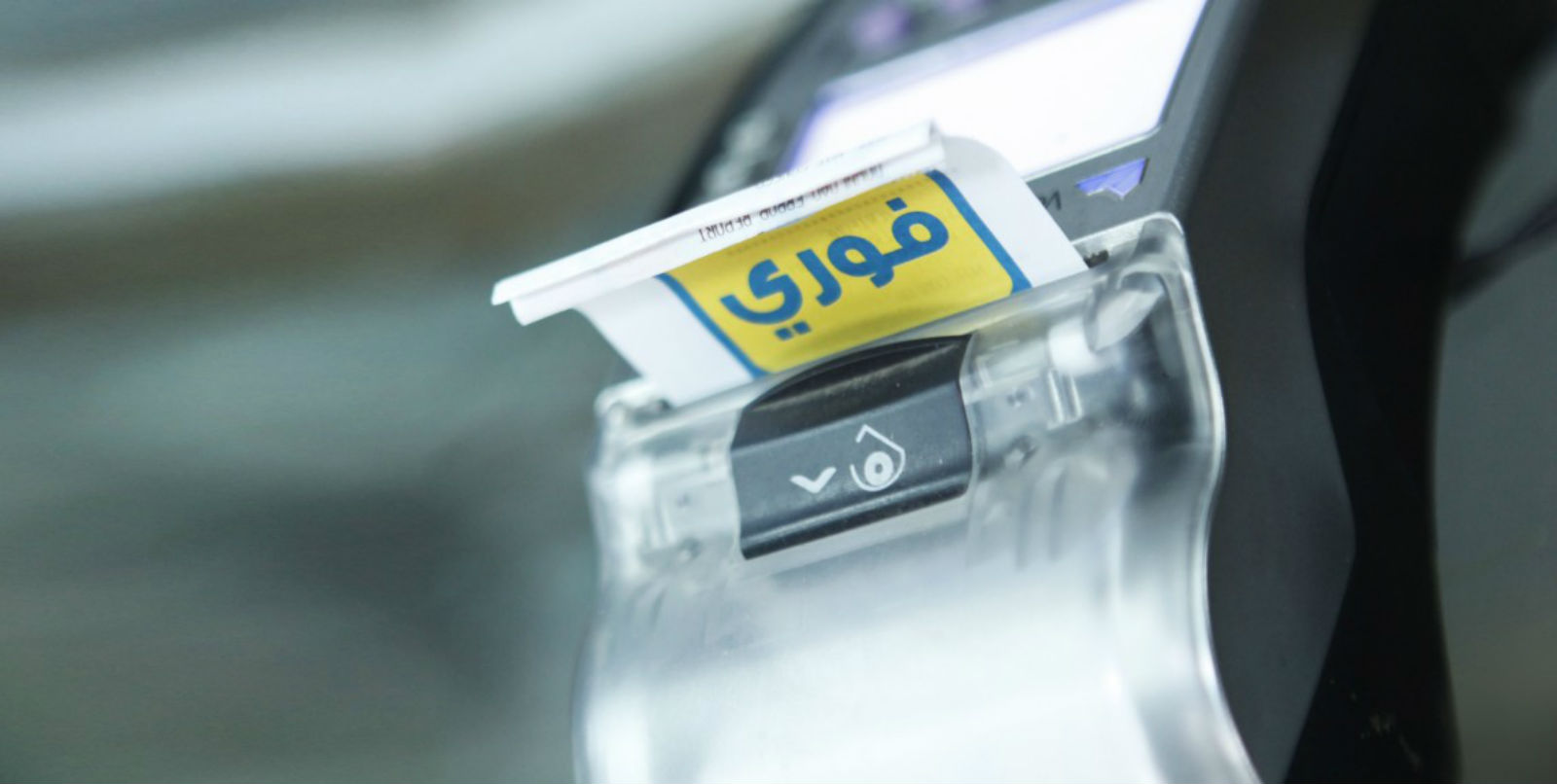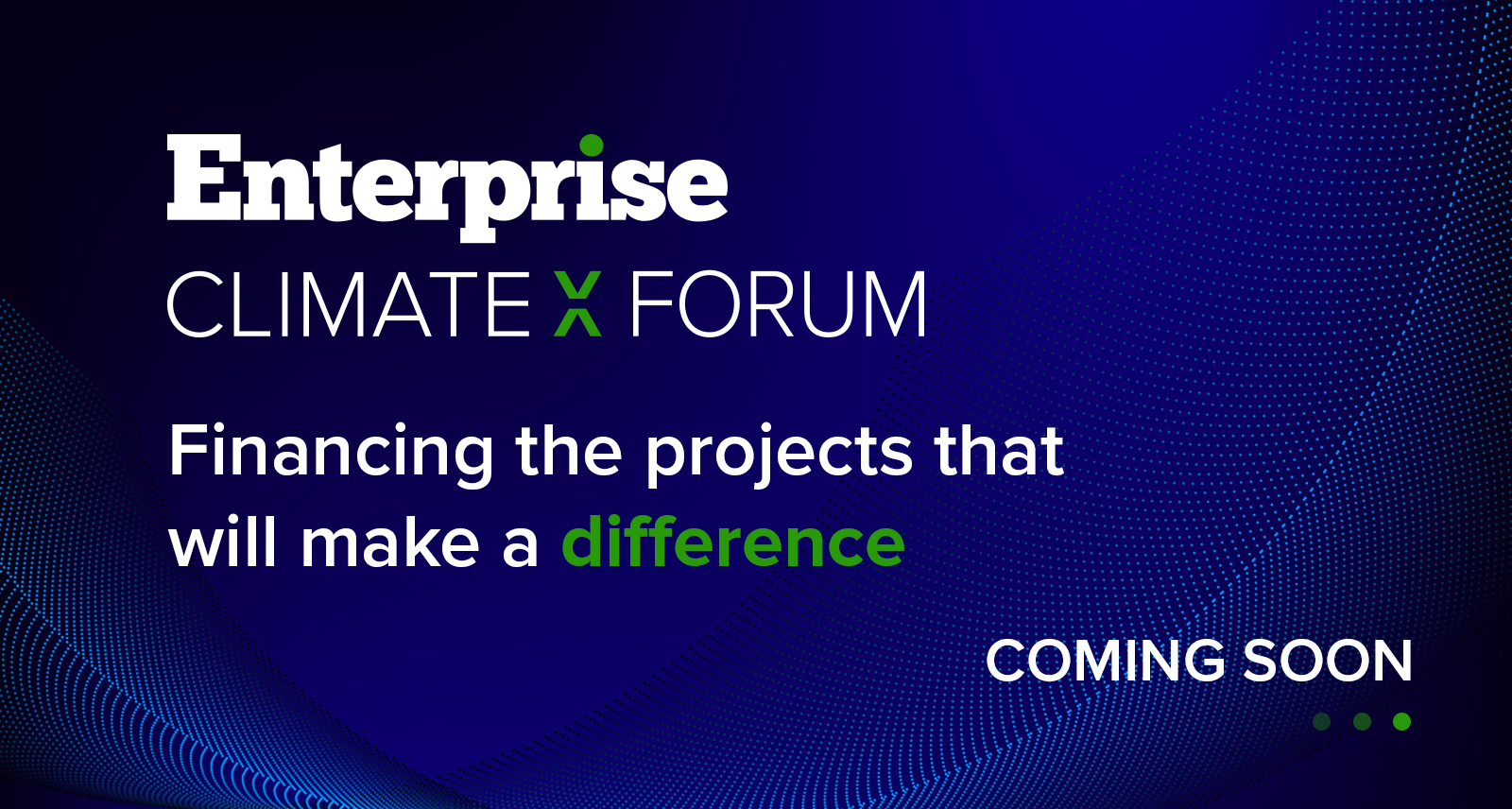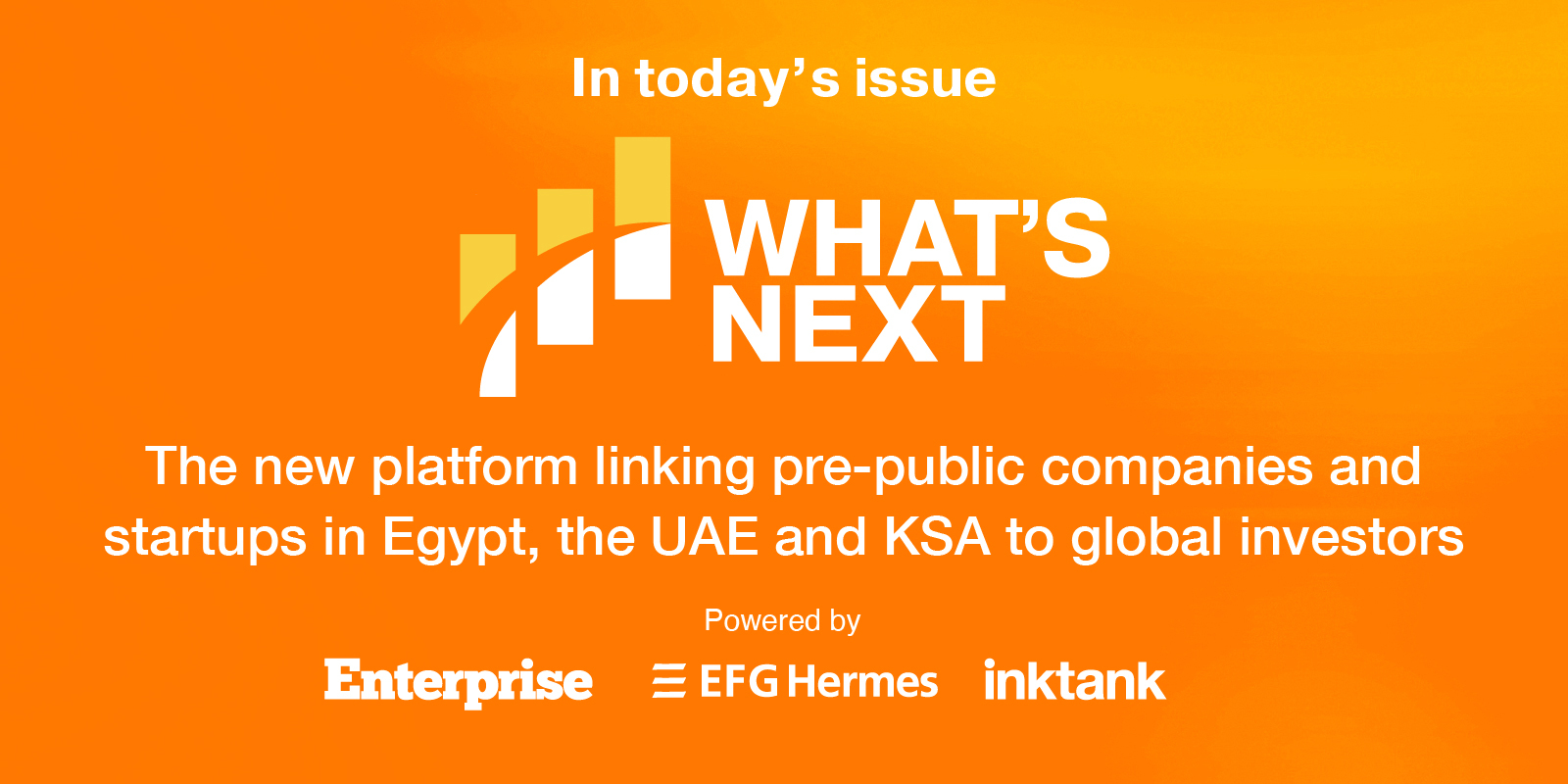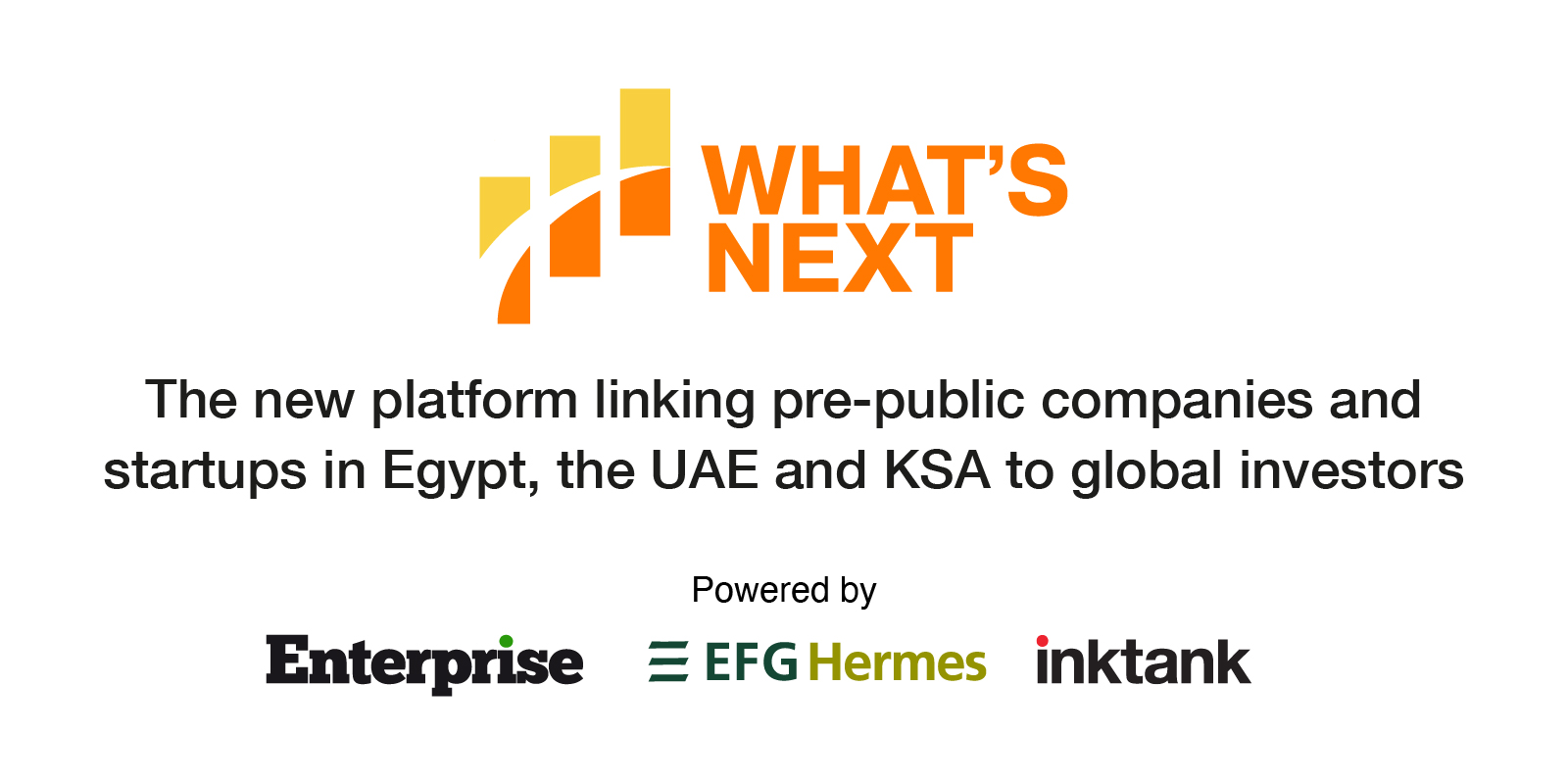- At least four local banks have imposed limits on FX use + CBE said to be mulling onshore NDFs. (Foreign Exchange)
- World Bank revises Egypt’s growth forecast down to 4.8% this fiscal year.
- Current account deficit narrowed by 10.2% to USD 16.6 bn last fiscal year.
- Raya Holding meets with EGX chief as it eyes IPOs of two units as early as next year. (IPO Watch)
- The future flow regs are out + Fawry is going into BNPL next quarter. (Financial Services)
- Egypt-born, Saudi-based Glamera bags USD 1.3 mn seed funding round.
- IMF + World Bank fall meetings are this week — and is Maait readying investment incentives? (What We’re Tracking Today)
- How B2B e-commerce players are handling working capital pressures + the VC funding squeeze: Part II. (What’s Next)
- Central banks are hoarding USD in case they need to support their local currencies. (Planet Finance)

Sunday, 9 October 2022
AM — Four banks impose limits on FX use
TL;DR
WHAT WE’RE TRACKING TODAY
Good morning, friends. We hope the last long weekend of 2023 was kind to you — and that you’re ready for what is shaping up to be a very busy news week.
BUT FIRST- Happy Thanksgiving to our Canadian readers, who celebrate turkey day tomorrow. Our readers in the US are also enjoying a long weekend in observance of Columbus Day.
THE BIG STORY here at home: At least four banks have imposed limits on credit card transactions in foreign currencies and / or cash withdrawals abroad. The move does not appear to have been ordered by the Central Bank of Egypt: The National Bank of Egypt (the nation’s largest lender) has not yet changed its policy on FX use and Banque du Caire tells us the limits were not ordered by the CBE. We have chapter and verse in this morning’s news well, below.
The news comes as the ministers of finance, planning, and trade and industry are set to appear before the House Industry Committee this week to discuss the availability of FX and a pileup of goods at ports.
IT’S A BIG WEEK FOR- The global economy as the IMF and World Bank annual meetings take place in Washington, DC, starting tomorrow and wrapping up a week from today.
Clouds are darkening the IMF’s crystal ball: The global economy could lose USD 4 tn in output through 2026 as we head toward recession, Bloomberg reported IMF Managing Director Kristalina Georgieva as saying ahead of the annual meetings. Things are “more likely to get worse than to get better,” Georgieva said, warning that we could be in for yet more economic shocks in the near future.
Egyptian officials are expected to attend the meetings alongside a number of senior members of the banking community. It so far seems unlikely that the IMF’s executive board will sign off on an assistance package for Egypt during the meetings: The board’s public schedule shows no sessions this week.
WATCH THIS SPACE #1- New incentives for business coming? Global economic conditions demand new investment incentives to shore up local manufacturing and the agriculture sector, Finance Minister Mohamed Maait said at a conference on Wednesday, according to a statement. The incentives are needed to make space for more private sector participation in the economy and clear “hurdles” facing the business community to create a better business environment, Maait said. The minister did not give hints about the types of incentives that might be in the pipeline.
WATCH THIS SPACE #2- Bulgaria wants LNG from Egypt: Bulgaria is interested in importing liquefied natural gas from Egypt, Bulgarian Energy Minister Rossen Hristov told Oil Minister Tarek El Molla during a meeting on Wednesday, according to a ministry statement. Egypt’s natural gas could make its way to other southeastern European countries through Bulgaria, the statement says. Egypt has been looking to ramp up its exports of natural gas to bring in additional foreign currency.
SOUND SMART- Greece and Bulgaria recently commenced commercial operation of a natural gas pipeline that’s designed to decrease southeast Europe’s reliance on Russian gas and to bolster energy security, Reuters reported.
PSA- No National Dialogue before economic conference, COP. The Sisi administration’s National Dialogue won’t begin until after the COP27 climate summit has wrapped, sources with first-hand knowledge of the matter told us yesterday. The Madouly government’s planned economic conference in late October and the major UN summit in early November “will make it difficult” to hold the dialogue in the next few weeks, we’re told.
KUDOS- Naguib Samih Sawiris is launching an elite, leadership- and service-oriented boarding school in El Gouna — with need-based scholarships to attract students from across the country, whether they’re coming from public, private or international schools. Two nonprofit foundations will help ensure Egypt’s best and brightest can afford to attend Manara School, which Sawiris said in a statement (pdf) will “provide students with a rigorous educational program, along with an academic, leadership and athletic program, in addition to community service activities and daily household tasks.” Teachers and faculty will also live on the Gouna campus, which will enroll its first class in 2023. Manara aims to cap class sizes at 15 students. More of this, please.
HAPPENING TOMORROW-
Inflation to notch new highs? Analysts are expecting inflation to have continued rising in September due to the weakening EGP after reaching highs not seen since November 2018 in August. We’ll find out when Capmas and the CBE release figures tomorrow.
A green Monday for the Senate: The Senate will on Monday discuss legislation that could set up a new regulatory body to make policy for the electric vehicles (EV) industry. Enterprise Climate last week reported in depth on the EV bill, which would also set up a fund to provide financing and incentives to investors looking to get in on local EV assembly in Egypt.
The Senate will also discuss amendments to the Environment Act that would see a “green fee” of between EGP 1k and EGP 500k levied against new diesel and gas vehicles. As the bill currently stands, some 80% of the proceeds would go towards localizing our EV industry, with the rest to be split between the Environment Protection Fund and the state budget.
ICYMI- The government’s automotive committee held its first meeting last month, inching us closer to the long-awaited automotive strategy.
COUNTDOWN TO COP–
US President Joe Biden will attend the Sharm El Sheikh climate summit, the Washington Post reports. Biden’s attendance will bring extra heft to the conference, the Post says — and likely more than makes up for last week’s news that the UK’s King Charles III is set to skip the climate gathering at UK Prime Minister Liz Truss' request.
MEANWHILE- The UAE is already talking up COP28, saying the gathering next year will be the “most significant climate conference since Paris,” according to a report in the National.
GFANZ is allowing banks to set their own green rules: Bank of England governor Mark Carney’s Glasgow Financial Alliance for Net Zero (GFANZ) will allow member firms to set their own governance structures, after banks reportedly threatened to leave the alliance due to legal risks associated with meeting strict decarbonization rules, Bloomberg writes. The move that will likely hurt ties with UN-backed Race to Zero, which had called for the banks to sign up to binding rules on cutting out fossil fuels.
***
Take our EV survey: Are you an ex-petrolhead shopping around for your first electric vehicle? EV-curious and wondering what all the fuss is about? Or are you not ready to say goodbye to that sweet smell of benzene as you wait at the gas station?
We want to hear from you: We’re taking the pulse on how the nation feels about Egypt’s nascent EV transition. Take a few minutes to fill out our short survey. We’ll be back with the results in a couple of weeks.
***
|
THE BIG STORY ABROAD-
OPEC+ on Wednesday pushed ahead with deep oil production cuts of 2 mn barrels per day — drawing the ire of US President Joe Biden, who had asked members of the oil cartel to help alleviate tight markets, Reuters reports. Ties between the US and key OPEC member Saudi Arabia will be strained by its biggest production cut since 2020, with US officials reportedly seeing the move as evidence of a Saudi shift toward Russia. Saudi officials are reported to have told counterparts in Washington that if it wants more oil in the markets, it should pump more of its own. The announcement saw oil prices rise some 4% on Friday to a five-week high, with Brent crude closing at USD 97.92 — bringing it closer to the USD 100-mark that was breached in the aftermath of the outbreak of war in Ukraine.
ALSO- An explosion yesterday caused damage to Russia’s crucial Crimea road and rail bridge, which serves as the country’s connection to the occupied Crimean Peninsula and the most important supply line for Russian forces located in southern Ukraine. Noone has yet claimed responsibility for the explosion, which killed three people. Russian President Vladimir Putin called on authorities to investigate. Rail traffic and some road traffic has already resumed.
The story is on the front page of every major foreign publication, including Reuters | FT | Washington Post | Wall Street Journal | AP.
DATA POINT-
MENA is the world’s fastest-growing crypto payment market, with USD 566 bn in crypto payments received between July 2021 and June 2021, rising 48% y-o-y, according to a Chainalysis report. Turkey — which the report considers part of the region — leads the pack with the largest crypto market, although its y-o-y growth has lagged behind other countries in MENA. Egypt comes in second, with Chainalysis noting the role of remittances and plans between the National Bank of Egypt and California-based Ripple to set up a “remittance corridor” allowing Egyptian expats in the UAE to send funds home.
REMEMBER- Crypto trading remains unregulated here and the central bank has issued several warnings — most recently last month — against trading digital assets.
CIRCLE YOUR CALENDAR-
Fuel prices to rise this month? We’re expecting the government to hike fuel prices for the seventh consecutive quarter when the fuel pricing committee meets this month. Fuel prices have risen by as much as 28% over the past 18 months in response to heightened international oil prices, which surged earlier this year on the back of Russia’s invasion of Ukraine.
The CEO Women Conference takes place in Cairo on Monday, 10 October. The event will bring together Arab and African businesswomen together to discuss women’s leadership and forge closer ties.
Check out our full calendar on the web for a comprehensive listing of upcoming news events, national holidays and news triggers.
*** It’s What’s Next day: We have our weekly deep-dive into what makes and shapes pre-listed companies and startups in Egypt, the UAE and KSA, touching on investment trends, future sector insights and growth journeys.
In today’s issue: Amid margin pressures and a slowdown in global VC funding, B2B e-commerce players are amending their financial models, including integrating new verticals and reworking their transaction costs and margins.
2CELLOS – LIVE AT SOMABAY: World-renowned and wildly popular cellist duo, 2CELLOS, are bringing the magic of music to Somabay on 18 November 2022. Get ready for an unforgettable night of captivating performances and electric energy. Book your ticket here.
FOREIGN EXCHANGE
Major local banks set withdrawal limits on using debit and credit cards abroad + CBE reportedly mulls allowing NDFs to trade

At least four major banks have in recent days imposed limits on foreign exchange use in what pundits say is a move to conserve hard currency. The changes come at the same time as the central bank is reportedly debating whether to allow the introduction of on-shore non-deliverable forwards (NDFs) in a move that could signal a more flexible exchange rate system is in the offing.
CIB, HSBC Egypt, state-owned Banque Misr, and the local arm of Emirati lender FAB have introduced withdrawal limits for debit and credit cards used abroad. Analysts tell us the move is likely design to conserve the banks’ FX assets.
The new limits:
- CIB has set monthly cash withdrawal limits abroad for debit cards at EGP 5k to 30k depending on card type, according to a statement. The bank has also set monthly limits on international purchases — whether made in person or online — at EGP 20k to EGP 200k for the majority of its accounts. Weekly international credit card cash withdrawal limits range from EGP 3k to EGP 30k.
- HSBC set a monthly cash withdrawal limit of USD 5k for both debit and credit cards, according to its website. The bank has not yet put in place any limits on foreign purchases.
- Banque Misr has set monthly cash withdrawal limits for credit and debit cards used abroad at USD 500 to USD 1.5k depending on card type, according to a statement. The bank also set monthly limits ranging from USD 1 k to USD 25k on foreign purchases made with debit cards. It wasn’t immediately clear when the bank revised the limits, though Masrawy is reporting that the new limits were published last week. Bloomberg Asharq reports that Banque Misr reduced its limits on the recommendation of the Central Bank of Egypt.
- FAB Egypt has lowered its limit on debit card ATM withdrawals abroad to EGP 10k from EGP 50k, head of personal banking Mariam Elsamny told Kelma Akhira (watch, runtime: 4:20).
Will other banks follow suit?
- The nation’s largest lender has yet to make any changes to limits: The National Bank of Egypt’s policy on withdrawals abroad and foreign use of credit cards has remained unchanged since 2019, Vice Chairman Yahya Aboul Fotouh told Enterprise
- Banque du Caire has received no instructions from the CBE on the matter and has not revised its foreign card withdrawal limits or fees, a bank official told us, adding that the bank’s systems regularly scan for “misuse” of credit cards.
The context: The net foreign liabilities position of the banking system hit an all-time high of USD 20 bn last week, analysts noted last week, citing data from the Central Bank of Egypt. That figure includes both commercial banks and the Central Bank of Egypt. The net foreign liability position of Egyptian banks collectively widened to USD 12 bn. In parallel, the net foreign liabilities position of the central bank itself improved by more than USD 1 bn to USD 8 bn thanks, analysts said, to acquisitions of state-owned assets by Saudi Arabia’s sovereign wealth fund.
THE RATIONALE for the restrictions: Easing pressure on FX assets. Most analysts we spoke with agreed that banks are likely moving to ease pressure on their net foreign assets, which as we note above have come under pressure in recent months.
What this probably is not: A centralized move to clamp down on a black market. Anecdotally, some folks (businesses and individuals alike) have been hoarding FX — or using credit cards to purchase small quantities of critical supplies they cannot import or find in stores. While it has lately become a popular parlor game in Cairo to discuss the “black market rate” for the greenback, the size and liquidity of that market unquestionably is a shadow of what it was in 2015-2016. Why? Cash deposit limits and the CBE’s years-long crackdown on abuse by exchange offices has effectively choked the black market: Even if you can source USD on the street, it is extremely difficult to get it into the formal banking system, let alone use it to cover imports. If the new restrictions were about the black market, the CBE would have imposed them system-wide.
MEANWHILE- The nation’s two largest banks have more than doubled the rate they’re paying on USD certificates of deposit. The National Bank of Egypt and Banque Misr are now offering 5.30% on three-year CDs and 5.15% on five-year deposits, up from 2.15-2.25%. The move is designed to pull into the banking system any USD liquidity currently stuffed under mattresses or in flour jars.
ALSO- Some local banks have reportedly ramped up FX markup fees for using debit and credit cards abroad, now charging as much as 6% from a prior 3%, Bloomberg Asharq reported, citing unnamed sources. Enterprise wasn’t able to independently verify the information by dispatch time this morning. Analysts are speculating the move, if true, represents banks trying to boost profitability after new reserve requirements for local currency threatens to curb their bottom lines. Look for some lenders to hike fees on personal or business loans, our sources tell us.
ARE WE GETTING ONSHORE NDFs?
New currency derivatives coming to increase liquidity? The CBE is set to permit new currency derivatives aimed at boosting liquidity in the market, Bloomberg reports, citing people it says have direct knowledge of the matter. The business information service says the CBE could allow onshore non-deliverable forwards (NDFs) and options to hedge against the risk of further currency depreciation. The move would bring more transparency to expectations of EGP movement and protect local companies against major fluctuations if the country moves towards greater currency flexibility, the business newswire reports.
“Egypt’s foreign-exchange market required new products a while ago,” our friend Hisham Ezz Al-Arab told Bloomberg. Ezz Al-Arab, the former chairman of CIB, is now senior adviser to Hassan Abdalla and emphasized to Bloomberg that he was speaking in a personal capacity.
RESERVES (BARELY) INCH UP
Egypt’s foreign reserves were effectively unchanged at nearly USD 33.2 bn in September, after remaining flat on the month before at USD 33.14 bn in August, according to central bank figures. While the increase is relatively small, this is the first uptick in the reserves figure since February. Reserves have fallen by c. 20% since war broke out in Ukraine and rising interest rates forced the central bank to cover portfolio outflows, finance imports and meet debt repayments.
ECONOMY
Word Bank raises its growth forecast for MENA and praises Egypt’s resolve to control inflation

The World Bank expects Egypt’s economy to grow at a 4.8% clip in FY 2022-2023, according to its October MENA Economic Update (pdf). The forecast marks a downward revision of 0.2 percentage points from its April forecast (pdf), when the bank expected Egypt to grow 5.0% during the current fiscal year.
Egypt is outperforming most other oil importers in the region — the exception being Djibouti, which is expected to see its economy grow 5.3% in 2023. MENA’s net oil importers are seeing “heightened stress and risk” to their economies due to “higher import bills, especially for food and energy, and from the depreciation of local currencies in some countries,” the report says. Debt service burdens are growing for oil importers, including Egypt, Jordan, and Tunisia, as global interest rates are on the rise with the wave of monetary tightening, the report notes. These countries are also facing increased expenses from inflation mitigation programs (think food + energy subsidies and cash transfer programs like Takaful and Karama here in Egypt), which the World Bank says require us to “cut other expenditures, find new revenues, or increase deficit and debt” to continue financing.
Cash (for the poorest) is king: Policymakers in Egypt intervened in “product-markets” through wide subsidies on foodstuffs and energy, which helped to keep annual inflation 4.1 percentage points lower than it would have been without intervention, the World Bank says. But adopting a “subsidy on food and energy prices that benefits the entire population costs 13.2 times more than allowing prices to increase and supporting just the poorest 10% of the population with a cash transfer,” according to the report.
The region as a whole is on track for its best growth year since 2016 — but performance is mixed: Growth across the MENA region is expected to come in at 5.5% in calendar year 2022, which the World Bank notes is the fastest rate in six years, before slowing to 3.5% in 2023. “This average growth masks uneven patterns across countries. In the GCC, growth is expected to accelerate to 6.9% in 2022” on the back of higher crude oil prices, while non-GCC oil exporters will also see similar (albeit lower) growth.
The same goes for real GDP growth per capita, which is set to accelerate to 3.9% in 2022 but will slow to 2.0% in 2023. “Again, this growth is uneven among the country groups. GDP per capita growth for GCC countries is expected to accelerate to 5.5% in 2022 before slowing to 2.4% in 2023. The corresponding rates are 2.5% and 1.1% for developing oil exporters,” while oil importers will see GDP per capita growth at 2.9% this calendar year and 2.7% in 2023.
ECONOMY
Egypt ends FY 2021-2022 on a good note, despite turbulence

Egypt’s current account deficit narrowed by 10.2% to USD 16.6 bn in FY 2021-2022, buoyed by oil and non-oil exports, rising tourism receipts, and a jump in FDI, according to central bank figures (pdf) released Thursday. “These developments came despite the decline in global economic activity triggered by the Russian-Ukrainian crisis, which has driven up energy and commodity prices significantly,” leading to a monetary tightening wave to put a cap on inflation, the central bank said.
The brightest spot: Tourism receipts more than doubled y-o-y to USD 10.7 bn as tourist arrivals gained momentum after a slump triggered by the war in Ukraine, which had a significant impact on tourism from Russia and Ukraine — two of our key tourism markets. Tourist arrivals increased more than 85% y-o-y in 1H 2022 to reach 4.9 mn visitors. Egypt has been working overtime to attract visitors from other European markets to drive inbound traffic, with efforts also including luring tourists from little-tapped markets in Latin America and other markets, including the Gulf.
FDI also picked up steam during the year: Net foreign direct investment rose 71.4% y-o-y to USD 8.9 bn during the fiscal year that ended in June. Net FDI in the non-oil sector recorded USD 11.6 bn, the majority of which came in during 2H 2021-2022 (which is when our Gulf neighbors went on a spending spree in Egypt). Greenfield investments and capital increases from existing companies accounted for USD 3.4 bn of non-oil FDI, according to the balance of payments.
Rising natgas prices + bigger export volumes moved our oil trade to the positives: Egypt’s oil trade balance recorded a USD 4.4 bn surplus for the year, from a deficit of USD 6.7 mn during FY 2020-2021, thanks to the global hike in natural gas prices and our entry to new markets including Turkey, Italy, France and Greece.
Also contributing to the narrowing current account deficit:
- Suez Canal revenues jumped 18.4% y-o-y to a record USD 7 bn for the fiscal year, and hit a monthly record of USD 744.8 mn in July.
- Overall exports rose over 53% y-o-y to EGP 43.9 bn thanks to an increase in both oil and non-oil exports.
- Remittances from Egyptian expats increased slightly to USD 31.9 bn, from USD 31.4 bn last year.
Offsetting the improvements:
- Non-oil trade, which saw its deficit widen 13.7% y-o-y to USD 47.8 bn. Non-oil imports jumped 18.7% y-o-y on the back of rising commodity prices, namely that of agricultural products — wheat, soybeans and corn.
- Outflows: Unease over the war and rising interest rates resulted in some USD 21 bn in net outflows over the year, reversing net inflows of USD 18.7 bn the year prior amid a “mass exodus of hot money from emerging markets.”
On a quarterly basis, the trends are much the same: Egypt’s current account deficit in 4Q 2021-2022 came in at USD 2.96 bn, dropping 42% y-o-y, while FDI soared 272% y-o-y to USD 1.59 bn. Reuters also has the story.
IPO WATCH
Aman Holding and Raya Trade & Distribution could be heading to the EGX

Raya Holding getting serious about Aman Holding IPO + adds Raya Trade to the pipeline: Raya Holding met with EGX Chairman Ramy El Dokany last week to discuss market conditions as the company looks to IPO its non-banking financial services (NBFS) outfit, Aman Holding. The company is also considering debuting Raya Trade & Distribution on the EGX, Raya Holding Chief Investment Officer Ahmed Nour Eldin told Enterprise, confirming a report first published in Al Mal.
First up, Aman Holding: The size of the stake that will be on offer has yet to be determined, Nour Eldin told us, saying only that it will have to be “sizeable for international investors to consider subscribing.” The company has repeatedly postponed plans to list Aman due to market turbulence, in July reportedly saying it would push the transaction to 2023. The company is waiting on advisors to give the green light to move ahead. Raya is still looking at next year for its potential IPO, Nour Eldin confirmed.
Capital increase coming? Raya is “currently in talks with our partner to further increase the capital of Aman to around EGP 1 bn,” Nour Eldin said. Aman last year brought in the National Bank of Egypt (NBE) as a strategic partner and minority shareholder, with the state-owned lender acquiring 24% of the company in an EGP 480 mn transaction.
Raya Trade & Distribution could also hit the EGX: Raya Holding is currently in talks with investors about whether to move ahead with an EGX debut for the trade and distribution line of the business, or alternatively engage with a minority investor to bring in more capital, Nour Eldin told us. This capital injection would help Raya Trade expand its footprint in international markets like Nigeria, where the company is already operational and brought in EGP 1 bn of revenues last year, he said.
Advisors: CI Capital are advisors, underwriters and bookrunners for Raya Trade & Distribution. EFG Hermes are advisors, underwriters and bookrunners for Aman Holding. Zaki Hashem & Partners are serving as legal advisors for both potential IPOs.
FINANCIAL SERVICES
Future flow securitization regs are out + Fawry wants a piece of the BNPL market

Future flow securitization has officially arrived: The Financial Regulatory Authority (FRA) has issued its regulations for future flow securitization, the regulator said in a statement (pdf), paving the way for the country’s first issuance.
This opens the door to our first future flow securitization issuance, courtesy of CIRA: EGX-listed private sector education outfit CIRA in July became the first company to receive approval from the FRA to take a EGP 2 bn future flow securitized bond program to market. Amendments to the Capital Markets Act that introduce future flow securitization were signed into law in March, after the FRA approved the instruments for use in May 2021.
It’s good news for public-sector projects, too: Public agencies will be able to use future flow issuances to raise funds for new projects and to improve existing services without depleting state coffers, FRA chief Mohamed Farid said in the statement. He singled out utilities including water, electricity, gas, and recycling, national railway and subway projects, and the telecoms sector as among those well placed to take advantage of future flow issuances.
Missed our explainer on future flow? Future flow securitization differs from traditional securitization in that it allows the securitization of payments that aren’t yet on the company’s balance sheet, giving companies access to liquidity without needing a big portfolio of accounts receivables (think: home and car financing, leasing portfolios and the like). Future income — whether from club memberships, phone bills, utility payments, tuition fees or rents — is packaged into securities and offered to investors in order to raise capital. Tap or click here to check out our full explainer.
FAWRY EYES BNPL MARKET-
E-payments giant Fawry is planning to launch its consumer finance business in 1Q 2023, Chief Investor Relations Officer Hassan Abdel Gelil told Enterprise. Fawry has earmarked around EGP 400 mn from the proceeds of a recent EGP 800 mn capital increase to tap the consumer finance market with its new buy-now-pay-later (BNPL) platform, Abdel Gelil told us. The EGX-listed company had previously said it would launch Fawry Consumer Finance in 2022.
STARTUP WATCH

Egypt-born B2B beauty startup Glamera secured a USD 1.3 mn seed funding round led by Riyadh Angel Investors, with participation from Techstars Accelerator, Ithraa Capital, 100 Ventures, Silicon Valley Venture, Lucrative Ventures, and angel investors, according to a statement (pdf).
Where the money’s going: Glamera plans to use the investment to finance the launch of new services and expand to other unnamed Gulf markets, the statement says.
About the company: Founded in Egypt by Mohamed Hassan (LinkedIn) and Omar Fathy (LinkedIn) before relocating to Saudi Arabia, Glamera offers B2B services to businesses including salons, gyms, and spas in Cairo, Alexandria, and several Saudi cities. It also provides a B2B2C marketplace where customers can search for and book beauty and lifestyle appointments.
LAST NIGHT’S TALK SHOWS
New foreign withdrawal limits imposed by some local banks headlined last night’s talk shows. Veteran banker Sahar El Damaty urged people to rationalize their USD use as the state works to secure FX assets in a phone call with Kelm Akhira (watch, runtime: 4:04), pointing the finger at those who withdraw excessive amounts while abroad to sell later through the black market. First Abu Dhabi Bank Egypt’s head of personal banking, Mariam Elsamny, also joined Kelma Akhira to explain why the bank has lowered its withdrawal limits (watch, runtime: 4:20). We break down the new withdrawal limits in this morning’s Banking section, above.
Economists call for more private sector participation: The state needs to exit sectors where its participation gives it an unfair advantage, economic analyst Hany Geneina told Al Mowagha (watch, runtime: 0:24). The private sector hasn’t been investing in the country as much as it once did and current conditions are to blame, Edita CEO Hani Berzi said (watch, runtime: 0:35 | 0:21). “It’s not the state’s role at all to work in certain sectors,” Berzi said, without elaborating. The Madbouly government is expected to lay out its state ownership policy — a roadmap for large-scale privatization of the economy — at the economic conference planned for the end of this month.
FACT CHECK- Shipping firms haven’t been looking at alternative routes to the Suez Canal after the Suez Canal Authority (SCA) said it will hike transit fees by 15% next year, the authority said in a statement. Al Hayah Al Youm had the story (watch, runtime: 2:51).
EGYPT IN THE NEWS
Funding the new capital: The New York Times is out with a feature examining what it thinks is the USD 59 bn cost of the new capital as the country struggles with rising inflation and interest rates. With the government issuing high-interest bonds to help cover the cost, the Gray Lady is worried about the risk of default.
Also making headlines:
- An online petition demanding the repatriation of the Rosetta Stone from the UK has gathered some 2.5k signatures so far. (Reuters)
- Replanting mangroves is one way to combat the impacts of climate change. (AFP)
- Our human rights record is getting attention from the United Nations (Statement | AP) and the Wall Street Journal.
ALSO ON OUR RADAR
Belgium’s DEME Group has been awarded large-scale dredging project as part of the development of Abu Qir Port, Al Mal reports, citing sources it claims are familiar with the matter. The dredging work will serve the set up of new islands and a marina for yachts in Alexandria. DEME has been active in the local market lately, earlier this year submitting a USD 3.6 bn proposal to build a green hydrogen project in the Suez Canal Zone (SCZone).
Other things we’re keeping an eye on this morning:
- Al Babtain Power & Telecom Egypt signed two contracts worth a combined USD 52 mn with Giza Cable Industries and Elsewedy Electric to supply steel towers for the electrical interconnection between Saudi Arabia and Egypt, and a project in Morocco. (Disclosure | Disclosure)
- Trial operations have begun on a stretch of the new Cairo Metro Line 3 running from Attaba to Kit Kat. The line is set to open during COP27. (Statement)
- Some 63k tons of French wheat arrived at Safaga port yesterday. (Youm7)
- The Health Ministry and Italy’s San Donato hospitals are discussing co-founding a medical training center in Port Said. (Statement)
PLANET FINANCE
Central banks everywhere are stocking up on USD as they prepare to prop up their currencies: Central banks are letting go of their US Treasuries in favor of cold hard cash that could be deployed to boost their local currencies if necessary, Bloomberg reports. Central banks sold a combined USD 81 bn in Treasury securities over the past four weeks, in the most aggressive selloff since March 2020. At the same time, the Fed’s foreign reserve repurchase agreement facility — which allows central banks to hold USDs — saw inflows of USD 61 bn. That suggests policymakers “want to build up their cash position potentially for the purpose of defending their currencies,” one strategist said.
Also worth knowing about this morning:
- Burjeel Holdings IPO priced at bottom of range: The Abu Dhabi healthcare firm and its selling shareholder VPS Healthcare Holdings raised USD 300 mn (AED 1.1 bn) in the IPO, priced at AED 2.0 a share. Burjeel begins trading on the Abu Dhabi stock exchange tomorrow. (Bloomberg)
- Asia is witnessing its sharpest increase in local currency-denominated bond issuances in more than a decade as USD debt gets pricier. (Reuters)
- The UAE’s PMI — S&P Global’s gauge of private sector activity — dipped to 56.1 in September, after reaching a more than three-year high of 56.7 in August. (Statement)
|
|
EGX30 |
10,011 |
+0.9% (YTD: -16.2%) |
|
|
USD (CBE) |
Buy 19.61 |
Sell 19.69 |
|
|
USD at CIB |
Buy 19.63 |
Sell 19.69 |
|
|
Interest rates CBE |
11.25% deposit |
12.25% lending |
|
|
Tadawul |
11,758 |
-0.1% (YTD: +4.2%) |
|
|
ADX |
9,905 |
+0.1% (YTD: +16.7%) |
|
|
DFM |
3,373 |
+0.7% (YTD: +5.5%) |
|
|
S&P 500 |
3,640 |
-2.8% (YTD: -23.6%) |
|
|
FTSE 100 |
6,991 |
-0.1% (YTD: -5.3%) |
|
|
Euro Stoxx 50 |
3,375 |
-1.7% (YTD: -21.0%) |
|
|
Brent crude |
USD 97.92 |
+3.7% |
|
|
Natural gas (Nymex) |
USD 6.75 |
-3.2% |
|
|
Gold |
USD 1,709.30 |
-0.67% |
|
|
BTC |
USD 19,408 |
-0.7% (YTD: -58.3%) |
THE CLOSING BELL-
The EGX30 rose 0.9% at Wednesday’s close on turnover of EGP 941.06 mn (2.5% below the 90-day average). Foreign investors were net sellers. The index is down 16.2% YTD.
In the green: Qalaa Holding (+3.1%), CIB (+2.5%) and Palm Hills Development (+2.3%).
In the red: CIRA (-1.6.%), Orascom Construction (-1.2%) and Madinet Nasr Housing and Development (-1.1%).
CALENDAR
SEPTEMBER
27 September-27 October (Tuesday-Thursday): The Egyptian Museum and the Manial Palace Museum host a book fair.
OCTOBER
October: Air Sphinx, EgyptAir’s low-cost subsidiary to commence operations.
October: Fuel pricing committee meets to decide quarterly fuel prices.
10 October (Monday): The CEO Women Conference.
10-14 October (Monday-Friday): Gitex Global, Dubai International Convention and Exhibition Centre, Dubai, UAE.
10-16 October (Monday-Sunday): World Bank and IMF annual meetings, Washington, DC.
15 October (Saturday): Cairo Metro will launch a global tender for maintenance work on the power stations and overhead catenary system of Line 1.
16-19 October (Sunday-Wednesday): Cairo Water Week 2022, Nile Ritz Carlton, Cairo.
17 October (Monday): Fifth Egypt and UN-led regional climate roundtable ahead of COP27, Geneva, Switzerland.
18 October (Tuesday): The Egyptian-Swedish business forum, Stockholm, Sweden.
23-25 October (Sunday-Tuesday): Egypt economic conference, Cairo, Egypt.
24 October (Monday): Empowering Sustainable Trade Flows with Factoring conference, St. Regis Cairo.
27 October (Thursday): European Central Bank monetary policy meeting.
27-30 October (Thursday-Sunday): Cairo ICT, Egypt International Exhibition Center, New Cairo.
30 October – 1 November (Sunday – Tuesday): Egypt Energy, Egypt International Exhibition Centre (EIEC) in New Cairo.
Late October-14 November: 3Q2022 earnings season.
Late October: First Abu Dhabi Bank to complete full integration with Bank Audi’s Egyptian operations after merger.
NOVEMBER
1-2 November (Tuesday-Wednesday): Federal Reserve interest rate meeting.
1-2 November (Tuesday-Wednesday): Arab League annual summit, Algiers, Algeria.
3 November (Thursday): Central Bank of Egypt’s Monetary Policy Committee meeting.
3-5 November (Thursday-Saturday): Egypt Fashion Week.
4-6 November (Friday-Sunday): Autotech auto exhibition, Cairo International Exhibition and Convention Center.
6-18 November (Sunday-Friday): Egypt will host COP27 in Sharm El Sheikh.
7 November (Monday): The inauguration of the first line of the high-speed rail.
9 November (Wednesday): Finance Ministry to host “Finance Day” at COP27.
7-13 November (Mon-Sun): The International University Sports Federation (FISU) World University Squash Championships, New Giza.
21 November-18 December (Monday-Sunday): 2022 Fifa World Cup, Qatar.
DECEMBER
3 December (Saturday): Dior Men’s pre-fall collection show in Giza.
13-14 December (Tuesday-Wednesday): Federal Reserve interest rate meeting.
13-15 December (Tuesday-Thursday): US-Africa Leaders Summit.
15 December (Thursday): European Central Bank monetary policy meeting.
22 December (Thursday): Central Bank of Egypt’s Monetary Policy Committee meeting.
December: The Sixth of October dry port will begin operations.
December: Egyptian Automotive Summit.
December: Egypt to expand Sudan electricity link capacity to 300 MW.
JANUARY 2023
January: EGX-listed companies and non-bank lenders will submit ESG reports for the first time.
January: Fuel pricing committee meets to decide quarterly fuel prices.
1 January (Sunday): Use of Nafeza becomes compulsory for air freight.
1 January (Sunday): Residential electricity bills are set to rise as per the government’s six-year roadmap (pdf) to restructure electricity prices by 2025.
7 January (Saturday): Coptic Christmas.
24 January-6 February: The 54th Cairo International Book Fair, Egypt International Exhibition Center
25 January (Wednesday): 25 January revolution anniversary / Police Day.
26 January (Thursday): National holiday in observance of 25 January revolution anniversary / Police Day.
30 January-1 February (Monday-Wednesday): CI Capital’s Annual MENA Investor Conference 2023, Cairo, Egypt.
FEBRUARY 2023
11 February (Saturday): Second semester of 2022-2023 academic year begins for public universities.
13-15 February (Monday-Wednesday): The Egypt Petroleum Show (Egyps), Egypt International Exhibition Center, Cairo.
23-27 February (Thursday-Monday): The eighth annual Business Women of Egypt’s Women for Success conference.
MARCH 2023
March: 4Q2022 earnings season.
23 March (Wednesday) — First day of Ramadan (TBC). Maghreb will be at 6:08pm CLT.
APRIL 2023
17 April (Monday): Sham El Nessim.
22 April (Saturday): Eid El Fitr (TBC).
25 April (Tuesday): Sinai Liberation Day.
27 April (Thursday): National holiday in observance of Sinai Liberation Day (TBC).
Late April – 15 May: 1Q2023 earnings season.
MAY 2023
1 May (Monday): Labor Day.
4 May (Thursday) National holiday in observance of Labor Day (TBC).
22-26 May (Monday-Friday): Egypt will host the African Development Bank (AfDB) annual meetings in Sharm El Sheikh.
JUNE 2023
19-21 June (Monday-Wednesday) Egypt Infrastructure and Water Expo debuts at the Egypt International Exhibition Center.
28 June-2 July (Wednesday-Sunday): Eid El Adha (TBC).
30 June (Friday): June 30 Revolution Day.
JULY 2023
18 July (Tuesday): Islamic New Year.
20 July (Thursday): National holiday in observance of Islamic New Year (TBC).
23 July (Sunday): Revolution Day.
27 July (Thursday): National holiday in observance of Revolution Day.
Late July-14 August: 2Q2023 earnings season.
SEPTEMBER 2023
26 September (Tuesday): Prophet Muhammad’s birthday (TBC).
28 September (Thursday): National holiday in observance of Prophet Muhammad’s birthday (TBC).
OCTOBER 2023
6 October (Friday): Armed Forces Day.
Late October-14 November: 3Q2023 earnings season.
EVENTS WITH NO SET DATE
2H 2022: The inauguration of the Grand Egyptian Museum.
2H 2022: IEF-IGU Ministerial Gas Forum, Egypt. Date + location TBA.
2H 2022: The government will have vaccinated 70% of the population.
3Q 2022: Ayady’s consumer financing arm, The Egyptian Company for Consumer Finance Services, to release its first financing product.
3Q 2022: Swvl to close acquisition of Urbvan Mobility.
4Q 2022: Infinity + Africa Finance Corporation to close acquisition of Lekela Power.
4Q 2022: Electricity Ministry to tender six solar projects in Aswan Governorate.
4Q2022: Raya Holding subsidiary Aman and Qalaa Holdings’ Taqa Arabia to launch their fintech company.
4Q 2022: Saudi Jamjoom Pharma to inaugurate its EGP 1 bn pharma factory in El Obour.
End of 2022: Decent Life first phase scheduled for completion.
End of 2022: e-Aswaaq’s tourism platform will complete the roll out of its ticketing and online booking portal across Egypt.
2023: Egypt will host the Asian Infrastructure Investment Bank’s Annual Meeting of the Board of Governors in 2023.
1Q 2023: Adnoc Distribution’s acquisition of 50% of TotalEnergies Egypt to close.
Enterprise is a daily publication of Enterprise Ventures LLC, an Egyptian limited liability company (commercial register 83594), and a subsidiary of Inktank Communications. Summaries are intended for guidance only and are provided on an as-is basis; kindly refer to the source article in its original language prior to undertaking any action. Neither Enterprise Ventures nor its staff assume any responsibility or liability for the accuracy of the information contained in this publication, whether in the form of summaries or analysis. © 2022 Enterprise Ventures LLC.
Enterprise is available without charge thanks to the generous support of HSBC Egypt (tax ID: 204-901-715), the leading corporate and retail lender in Egypt; EFG Hermes (tax ID: 200-178-385), the leading financial services corporation in frontier emerging markets; SODIC (tax ID: 212-168-002), a leading Egyptian real estate developer; SomaBay (tax ID: 204-903-300), our Red Sea holiday partner; Infinity (tax ID: 474-939-359), the ultimate way to power cities, industries, and homes directly from nature right here in Egypt; CIRA (tax ID: 200-069-608), the leading providers of K-12 and higher level education in Egypt; Orascom Construction (tax ID: 229-988-806), the leading construction and engineering company building infrastructure in Egypt and abroad; Moharram & Partners (tax ID: 616-112-459), the leading public policy and government affairs partner; Palm Hills Developments (tax ID: 432-737-014), a leading developer of commercial and residential properties; Mashreq (tax ID: 204-898-862), the MENA region’s leading homegrown personal and digital bank; Industrial Development Group (IDG) (tax ID:266-965-253), the leading builder of industrial parks in Egypt; Hassan Allam Properties (tax ID: 553-096-567), one of Egypt’s most prominent and leading builders; and Saleh, Barsoum & Abdel Aziz (tax ID: 220-002-827), the leading audit, tax and accounting firm in Egypt.











